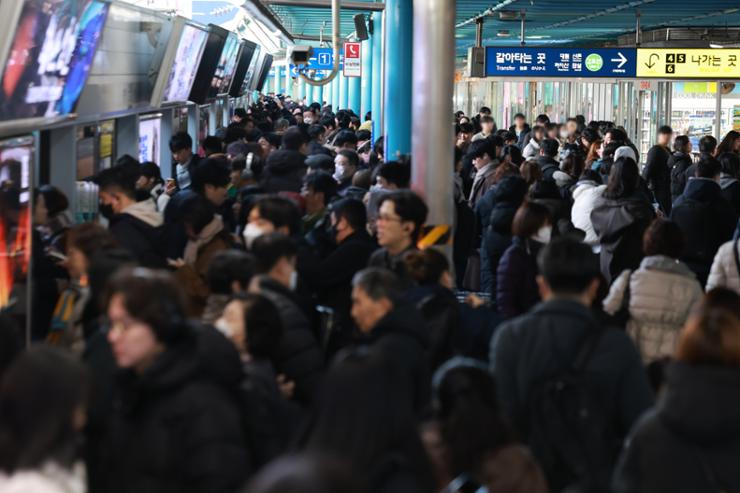Commuters crowd a platform at Sindorim Station on Seoul Metro lines 1 and 2, Dec. 5, 2024. Yonhap
Rising living costs discourage consumption ahead of Lunar New Year
By Ko Dong-hwan
Metro services across Seoul, Incheon and Gyeonggi Province will raise fares by 150 won ($0.10) within the first half of this year, according to the Seoul Metropolitan Government and Korea Railroad (KORAIL), Wednesday. KORAIL is the country’s state-run railway operator, running KTX bullet train service across the country, as well as other railway services and subway services across the capital region.
The measure is part of recent price hikes across a range of public utility services in the country. There have already been strong signs of people trying to save money by reducing consumption in retail sectors, particularly in restaurants, food and related markets amid scaled-up prices. The trend is apparently extending the nationwide consumption freeze to the Lunar New Year holiday next week when gift products are usually on high demands.
The metro fare hike will raise the current fare of 1,400 won. The Seoul government previously raised the fare in 2023 by the same amount from 1,250 won. Bus fares within the city also rose by 300 won at the same time.
The city authority said it had planned to raise the metro fares by the end of last year but had to postpone it because of the raging market price hikes across an extensive range of retail sectors. At the same time, the fare hike is inevitable, according to KORAIL, because the company has been operating at a deficit for years. It saw a deficit of 474.3 billion won in 2023 and its debt peaking at over 20 trillion won in the same year.
A city official said it has reached an agreement with KORAIL and surrounding municipal governments that the fare hike must proceed as planned and cannot be delayed any longer.
The fare hike comes as the country’s producer price index jumped last month by 0.3 percent from the previous month, the highest in the past five months. The rates of costs for public utility services including electricity, gas, tap water and waste treatment jumped by 0.4 percent from the previous month. Market prices for agricultural produces and seafood went up by 2.8 percent. Gasoline prices in Seoul surpassed 1,800 won per liter for the first time in 14 months.

Fruit gift sets prepared for Lunar New Year are on display at Daegu Department Store Plaza, Jan. 13. Yonhap
Amid the rising costs that affect almost all parts of people’s daily lives, consumption ahead of the holiday is also expected to shrink. According to surveys conducted by the Korea Chamber of Commerce and Industry (KCCI) earlier this month, almost 32 percent of 500 respondents said they will spend less than they did last year and 96 percent said they will spend no more than 100,000 won for the holiday this year.
Almost 59 percent of the respondents cited persisting scaled-up market prices as a reason to spend less on this year’s Lunar New Year. Continuing economic slump, household debt and reduced income followed with lower figures.
More than 68 percent of the respondents said price was their highest concern when purchasing gifts for the holiday. Preference of loved ones and luxuriousness, which were dominant standards in previous years, came out less important with 33 percent and 22 percent, respectively.
A KCCI official said that political unrest, a slumping economy and high market prices are currently fueling a consumption freeze in the country. He added that further government supports are required to make this year’s Lunar New Year a chance for domestic consumption to rebound.


